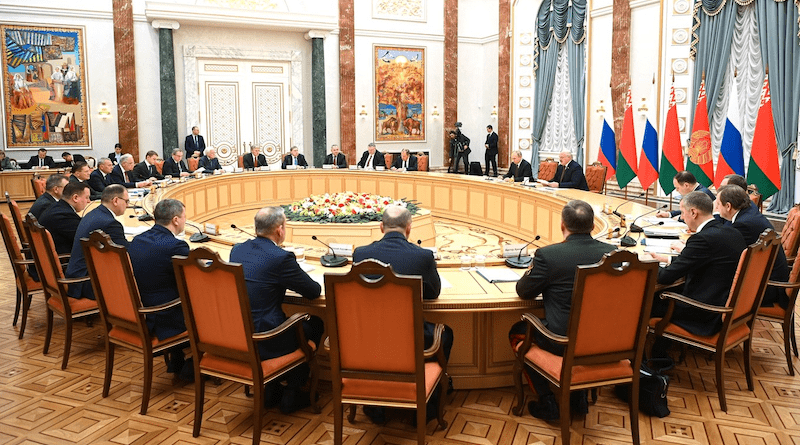Lukashenka, Putin Pledge Further Military Cooperation As Russia’s Invasion Of Ukraine Falters
By RFE RL
(RFE/RL) — Alyaksandr Lukashenka and Russian President Vladimir Putin have agreed during talks in Minsk that their countries will continue holding joint military exercises and will maintain military cooperation in other areas.
The agreements came on Putin’s first trip in more than three years to see the Belarusian strongman amid speculation that he may try to pressure Belarus to join the fight against Ukraine.
Russia and Belarus agreed on reinforcing cooperation “in all areas,” Putin said during a joint news conference after meeting with Lukashenka for about two and a half hours.
This includes “shared measures for the security of the two countries,” continued joint training, and “mutual weapons delivery,” Putin said.
Russia will continue training Belarusian crews to fly planes that can carry nuclear heads, Putin added. He also confirmed plans for the flight of a Belarusian cosmonaut in 2023.
Lukashenka said the talks emphasized economic issues.
“Today we can state unequivocally: Together we were able not only to endure, but also to find opportunities for the development of our economies,” he said.
But the Belarusian leader also mentioned military cooperation, saying Belarus has put the S-400 surface-to-air missile system and Iskander mobile guided missile systems handed over by Russia to combat duty as he raised his country’s relationship with Russia.
“Russia cannot go anywhere without us, we cannot do anything without Russia,” Lukashenka said.
Putin also denied having an interest in absorbing Belarus or any other country, saying such rumors came from “ill-wishers.”
The U.S. State Department said the statement was “the height of irony” as Putin seeks to absorb Ukraine.
Speaking at a daily briefing, spokesman Ned Price said Washington would continue to watch very closely whether or not Belarus would provide additional support to Putin and would respond “appropriately” if it does.
Putin’s visit to Minsk was his first trip in more than three years to see the Belarusian strongman and came hours after Russian forces attacked power grid and other infrastructure in Ukraine using kamikaze drones in an early morning attack on Kyiv and its surrounding districts.
Lukashenka’s office said prior to the meeting that the pair would hold one-on-one talks as well as wider negotiations with their ministers on integration, while Kremlin spokesman Dmitry Peskov rejected speculation that Russia would press its western neighbor to go to war against Ukraine.
Analysts and military officials said before the talks that Putin may seek to persuade Lukashenka to deploy Belarusian soldiers alongside Russian forces in a joint attack on Ukraine.
Other experts say the Russian leader may be trying to distract Ukraine’s military leadership and draw its forces away from fierce fighting in the east and toward the border with Belarus in the north.
Ukrainian Lieutenant General Serhiy Nayev said on December 18 that the two leaders were likely to discuss the “broader involvement” of the Belarusian military in the war.
Speaking to reporters ahead of Putin’s departure, Peskov called reports that Putin would push Lukashenka to take a more active role in the war “groundless” and “stupid.”
Defense Minister Sergei Shoigu was also reported to be in Minsk for meetings with his Belarusian counterpart as Russia faces manpower issues after 10 months of fierce resistance by Ukraine.
Russia is currently training thousands of its own troops in Belarus as it lacks enough facilities at home.
Moscow transferred at least 50 Ural military trucks to Belarus on December 16, according to a watchdog group that monitors the movement of Russian troops.
Experts have said that Russia may be preparing them for a large-scale offensive early next year.
Russia used Belarus, which shares a 1,000-kilometer border with Ukraine, as a launching pad for its invasion. However, Belarusian forces did not participate in the attack.

